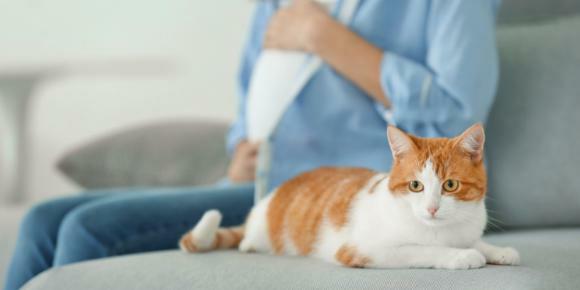Pregnancy and Cats
It’s a common question for pregnant female cat owners–is it safe for me to have a cat? The answer is yes..with a few precautions. Pregnancies come with many worries and owning a cat shouldn’t be one of them.
Cats are one of the most common carriers of a parasitic infection called Toxoplasmosis. One place it can be found is in cat feces. The risk of infection is low, but you want to take a few sensible precautions regarding the litter box if you’re pregnant or trying to conceive.
FAQs about toxoplasmosis, pregnancy & cats
What is Toxoplasmosis?
Toxoplasmosis is a parasitic infection that can infect humans and most warm-blooded animals. When the immune system is healthy, very few (if any) symptoms show up. Most people never realize they or their pets have it.
If a woman is infected with toxoplasmosis while pregnant, though, or has it at conception, it has the potential to cause serious birth defects.
Where is it most commonly found?
The parasite is usually found in raw or undercooked meat, cat feces, some garden soil, and sometimes in contaminated fruits and vegetables.
How are cats infected by the parasite?
Usually by eating mice or other small animals that are infected with the parasite.
Do I have to give up my cat?
Absolutely not. While Toxoplasmosis is serious for an unborn baby, there is also a low chance of getting it. There are many ways to avoid it, plus a lot of people with cats have already been infected and are now immune.
If my cat scratches me, will I be infected?
Toxoplasmosis is only transmitted orally. It is transmitted by touching your mouth after gardening or cutting raw meat, or after changing the cat litter box without protection.
What steps can I take to make sure I’m not infected?
- Ideally, ask someone else in the family to be responsible for cleaning the litter box during your pregnancy.
- The next best strategy is to change your cat’s litter boxes daily. Once your cat poops, it takes 1 to 5 days for the parasite to sporulate and become infectious. Changing the litter box daily eliminates the risk of infection from the litter box.
- Wear gloves and/or wash your hands after changing a litter box, after gardening or cleaning vegetables, and always after handling raw meat.
- Do not adopt stray or young cats. Stray cats are exposed to Toxoplasmosis more often by eating small animals or having a weakened immune system. Kittens are also prone to infection due to their weaker immune systems.
So I can pet my cat and not be infected?
Absolutely! Petting your cat will not result in becoming infected. As a matter of fact, while Toxoplasmosis is a danger to an unborn baby, the chances of actually being infected are very low.
I have a cat and a dog. Can I get Toxoplasmosis from my dog?
The risk is even lower with dogs. But, yes, it can be seen in dogs that dig around in infected soil or eat cat feces, especially if stray cats roam your yard. You would also want to avoid touching dog poop just in case.
I’m around a lot of cats. Is it possible to already have been exposed to Toxoplasmosis?
Yes, it is quite possible you have already had (or do have) Toxoplosmosis. If you’re concerned or trying to conceive, we recommend that you be tested since it is the only way to know if you have it.
There is no one else who can change my cat’s litter box. Will I be okay?
While it’s best to have someone else change your cat’s litter box, it isn’t necessary. Wear gloves and change the litter box daily in order to avoid being infected. Or at least wear gloves and thoroughly wash your hands after handling anything that has touched the litter box.
If you have any questions about Toxoplasmosis or the safety of caring for your cat during pregnancy, please feel free to contact one of us here at Union Lake Veterinary Hospital.

